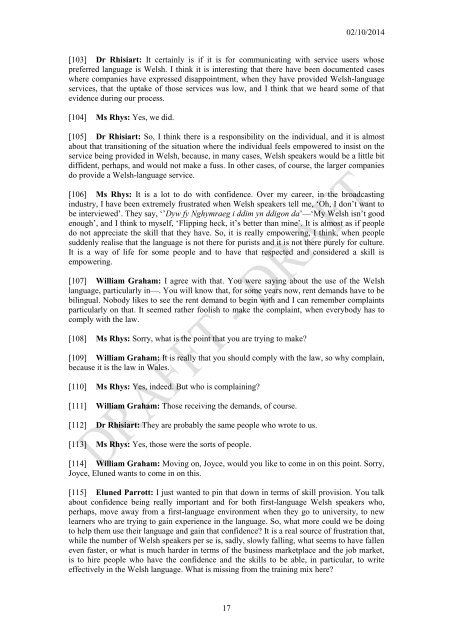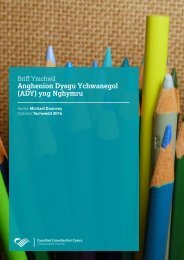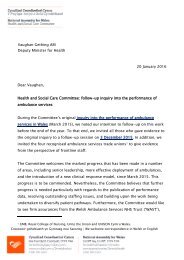You also want an ePaper? Increase the reach of your titles
YUMPU automatically turns print PDFs into web optimized ePapers that Google loves.
02/10/<strong>2014</strong><br />
[103] Dr Rhisiart: It certainly is if it is for communicating with service users whose<br />
preferred language is Welsh. I think it is interesting that there have been documented cases<br />
where companies have expressed disappointment, when they have provided Welsh-language<br />
services, that the uptake of those services was low, and I think that we heard some of that<br />
evidence during our process.<br />
[104] Ms Rhys: Yes, we did.<br />
[105] Dr Rhisiart: So, I think there is a responsibility on the individual, and it is almost<br />
about that transitioning of the situation where the individual feels empowered to insist on the<br />
service being provided in Welsh, because, in many cases, Welsh speakers would be a little bit<br />
diffident, perhaps, and would not make a fuss. In other cases, of course, the larger companies<br />
do provide a Welsh-language service.<br />
[106] Ms Rhys: It is a lot to do with confidence. Over my career, in the broadcasting<br />
industry, I have been extremely frustrated when Welsh speakers tell me, ‘Oh, I don’t want to<br />
be interviewed’. They say, ‘’Dyw fy Nghymraeg i ddim yn ddigon da’—‘My Welsh isn’t good<br />
enough’, and I think to myself, ‘Flipping heck, it’s better than mine’. It is almost as if people<br />
do not appreciate the skill that they have. So, it is really empowering, I think, when people<br />
suddenly realise that the language is not there for purists and it is not there purely for culture.<br />
It is a way of life for some people and to have that respected and considered a skill is<br />
empowering.<br />
[107] William Graham: I agree with that. You were saying about the use of the Welsh<br />
language, particularly in—. You will know that, for some years now, rent demands have to be<br />
bilingual. Nobody likes to see the rent demand to begin with and I can remember complaints<br />
particularly on that. It seemed rather foolish to make the complaint, when everybody has to<br />
comply with the law.<br />
[108] Ms Rhys: Sorry, what is the point that you are trying to make?<br />
[109] William Graham: It is really that you should comply with the law, so why complain,<br />
because it is the law in Wales.<br />
[110] Ms Rhys: Yes, indeed. But who is complaining?<br />
[111] William Graham: Those receiving the demands, of course.<br />
[112] Dr Rhisiart: They are probably the same people who wrote to us.<br />
[113] Ms Rhys: Yes, those were the sorts of people.<br />
[114] William Graham: Moving on, Joyce, would you like to come in on this point. Sorry,<br />
Joyce, Eluned wants to come in on this.<br />
[115] Eluned Parrott: I just wanted to pin that down in terms of skill provision. You talk<br />
about confidence being really important and for both first-language Welsh speakers who,<br />
perhaps, move away from a first-language environment when they go to university, to new<br />
learners who are trying to gain experience in the language. So, what more could we be doing<br />
to help them use their language and gain that confidence? It is a real source of frustration that,<br />
while the number of Welsh speakers per se is, sadly, slowly falling, what seems to have fallen<br />
even faster, or what is much harder in terms of the business marketplace and the job market,<br />
is to hire people who have the confidence and the skills to be able, in particular, to write<br />
effectively in the Welsh language. What is missing from the training mix here?<br />
17








